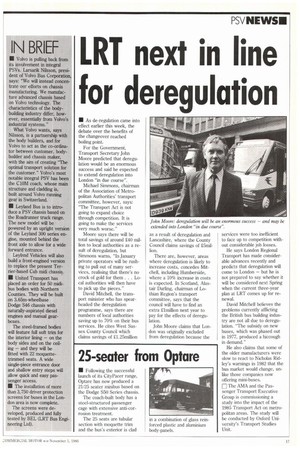IN BRIEF
Page 19

If you've noticed an error in this article please click here to report it so we can fix it.
• Volvo is pulling back from its involvement in integral PSVs. Larsarik Nilsson, president of Volvo Bus Corporation, says: "We will instead concentrate our efforts on chassis manufacturing. We manufacture advanced chassis based on Volvo technology. The characteristics of the bodybuilding industry differ, however, essentially from Volvo's industrial systems."
What Volvo wants, says Nilsson, is a partnership with the body builders, and for Volvo to act as the co-ordinator between customer, bodybuilder and chassis maker, with the aim of creating "The optimal transport solution for the customer." Volvo's most notable integral PSV has been the ClOM coach, whose main structure and cladding is. built around Volvo running gear in Switzerland.
• Leyland Bus is to introduce a PSV chassis based on the Roadrunner truck range. The new model will be powered by an upright version of the Leyland 300 series engine, mounted behind the front axle to allow for a wide forward entrance.
Leyland Vehicles will also build a front-engined version to replace the present Terrier-based Cub midi chassis.
• United Transport has placed an order for 50 midibus bodies with Northern Counties. They will be built on 3.65m-wheelbase Dodge S46 chassis with naturally-aspirated diesel engines and manual gearboxes.
The steel-framed bodies will feature full soft trim for the interior lining — on the body sides and on the ceiling — and they will be fitted with 22 moquettetrimmed seats. A wide single-piece entrance door and shallow entry steps will allow quick and easy passenger access.
• The installation of more than 3,750 driver protection screens for buses in the London area is now complete.
The screens were developed, produced and fully tested by BEL (LRT Bus Engineering Ltd).




















































































